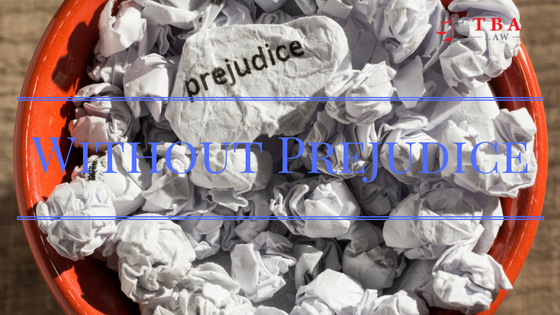Without Prejudice … How nice!
‘Without Prejudice’ … it is such a lovely thought, and then there is ‘Without Prejudice, Save as to Costs’ … how poetic. These are legal terms used during the process of negotiation and possible litigation matters, and their meaning is far more complex than they first appear.
So what does it all mean? You may have seen letter written by a legal practitioner headed with ‘Without Prejudice’, or your solicitor may have discussed having a ‘Without Prejudice telephone conversation’ with the legal representative for the other party in a litigation matter. It means any rights, or any current or future claim that solicitor’s client may have, has not been prejudiced by the discussion. In simple English, what is discussed and/or offered within a ‘Without Prejudice’ communication cannot be used by the other party to the detriment of any rights or claims you may have in your matter. If the communication is headed with ‘Without Prejudice, Save as To Costs’, it means the only time the communication can be used in Court is when the Court is appointing costs to either party. Until the court hands down their judgement, the communication remains privileged, and only becomes available to the court to consider while they are awarding costs.

The rational is simple: Courts want matters to resolve prior to litigation, so the process is aimed at a resolution of the problem through mutual agreement, mediation and negotiation. The ‘Without Prejudice’ privilege enables and encourages parties to discuss their options, to make offers of settlement, and to be honest in their dealings without fear of what they say becoming detrimental to their case. It encourages frank and open discussion, as well as offers being made to settle a matter. If made during litigation, it aims to shorten the litigation through settlement. Where your solicitor may include ‘Save as to Costs’ is where they have made a reasonable offer for full and final settlement. If the other party refuses this offer, it may assist you when the Court comes to awarding costs between the parties.
A party should not use the ‘Without Prejudice’ protection where you are not making any concessions, such as a letter of demand, or communications where parties are merely finalising the terms of an agreement. Essentially, if correspondence is not made in relation to settling a matter, ‘Without Prejudice’ is generally not necessary.
So far, so simple, right? Well, not…
As is customary within law, specific details must be thrashed out so as every possible scenario is predicted, and if not, the Court must decide on an outcome. There are always exceptions to any rule, that’s part of the charm of law!
There are some exceptions to the rule, where even if a document is marked ‘Without Prejudice’, the contents can still be introduced. The obvious exception is every legal practitioner’s duty not to mislead the court. No header on a letter will protect against misleading the court. Threatening correspondence that does not work towards a settlement can also be introduced, even when marked ‘Without Prejudice’. Correspondence can be used to prove settlement was reached, or to prove delay in reaching a settlement, and ‘Without Prejudice’ will not protect against misleading and deceptive conduct, or misrepresentation. Fraudulent or other such offences can also bring the privilege undone.
In other circumstances, ‘Without Prejudice’ communications can be used as evidence of negotiated terms where an agreement has been reached. If the conversation is witnessed by a third party, they can testify as a witness to what they heard. Finally, if both parties agree to waive privilege, it can be entered into evidence.
What is important to remember is that the ‘without prejudice’ privilege is for resolving disputes, not negotiating commercial agreements or other such contracts. It exists for a specific purpose, for genuine attempts at negotiation to achieve a settlement, so attempting to use it for another purpose will, for the most part, not succeed.
Of course, any discussion of Without Prejudice would not be complete without mention of the Evidence Act 1995 (Cth). Under s 131 of the Act, communications do not necessarily have to be marked as ‘Without Prejudice’ to be protected by the privilege. This occurs when a communication has a proper connection with the direct purpose of settling a dispute. Any communications between parties, or documents prepared in in connection with such negotiations, cannot be introduced into evidence.
So there you have it … communication marked ‘Without Prejudice’ may in fact not be protected by the privilege, where other communications not marked as such may be protected under the Evidence Act.
And that’s why we love the law!
[maxbutton id=”2″ ]





Leave A Comment